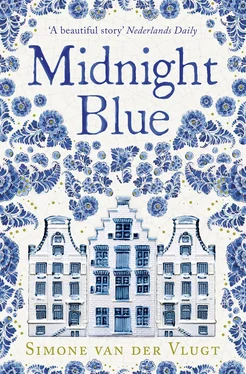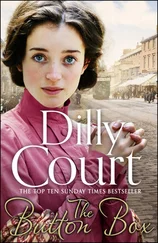I allow my gaze to wander around the room, from the round table next to the window to the fireplace and the furniture I painted myself. Sunlight falls on the flagstone floor and brings a little warmth. Not much, it’s only the beginning of March. The smoke drifts along the beams hung with sausages and bacon and up into the loft, which is still half full of winter stores.
It’s strange to have the house to myself, but I have no time to take it in. There’s work to be done and now that Govert’s gone there’s even more than usual.
Although I have a maid and a farmhand, there’s plenty left for me to do. Every day’s the same. I milk the cows, feed the pigs and chickens, tend the vegetable patch, churn the butter and make the cheese. I use the remaining time to wash and mend clothes, spin and weave and, very occasionally, to paint.
Now and then, when I glance at the shiny surface of a copper kettle, I catch a glimpse of my mother, her braided hair under a white cap. She’s always busy, always tired. I’m twenty-five but I feel much older.
Just keep going, I think as I head to the barn to check on the animals. The mourning period is only six weeks, not so long.
Jacob, the farmhand, has already started the milking. He greets me with a slight tilt of his chin. I nod by way of an answer.
‘I might be able to go and work for Abraham Goen,’ he says as I sit down on my stool.
‘That’s good.’
‘Now it’s only Jannet who has to find a job.’
‘It’ll all work out. If there’s nothing for her here, she’ll find something in Graft.’
‘When are you leaving?’ Jacob asks.
‘As soon as everything’s sold. The auction’s next week.’
Jacob nods. ‘Jannet would like to take the churn. Then she can make her own butter.’
‘I can’t give it to her. I’ve promised it to my mother.’
‘Oh. That’s a shame.’ Jacob pulls the full pail out from under the cow and stands up. The way he stands there makes me think he has something else to say, and I look at him expectantly.
‘About the boss …’
‘Yes?’
‘His brother’s been telling tales around the village.’
I stop milking. ‘What kind of tales?’
He hesitates.
‘What is it, Jacob?’ I say, a little too sharply, sounding impatient.
‘I think you know,’ he says, and walks away.
Yesterday I made buttermilk curds. Today, for lunch, I smear some of the sour leftovers onto a slice of rye bread. Jacob and Jannet are sitting at the table too. We don’t say much, all three of us are deep in thought.
After the meal, I leave the work to them. I pull on a pair of clogs and set off along the dyke towards De Rijp. The farm backs onto the circular canal around the Beemster polder, which is surrounded by marshy lowlands. My parents’ farm is on the far side of the village, and the quickest way there is to walk through it. I walk along Kralingergracht and onto the main street, where the shabby buildings give way to grand homes with green and red painted gables. Closer to the centre of the village there are even a few stone houses with stepped gables, which look like they’ve been left here by accident.
On the way, I say hello to people I know, who reply somewhat reluctantly. Are they avoiding me? Are people staring at me?
By the time I get to the Kleine Dam and the bustle around the weighing-house, I can no longer dismiss my concerns. People are throwing curious glances my way and whispering behind my back. Only one person comes up to ask how I am and whether it’s true that I’m leaving.
The people here are proud of their village, their families have lived here for generations. Leaving is unheard of, practically a betrayal. But the villagers always thought I was a bit odd, so my plans should come as no surprise.
‘Are you getting rid of that dresser as well? The one you painted so nicely?’ says Sybrigh the wholesaler. ‘I’d be happy to take that off your hands.’
‘The auction’s next week,’ I answer, and keep on walking with an apologetic smile.
I turn into narrow Church Street and leave the village. I can see my parents’ farm in the distance. When I reach the muddy track that will take me there, I quicken my pace.
‘Mart was just here.’ My mother is rinsing out milk churns under the pump. In the pale winter light her face looks thin and old, and when she straightens she presses a hand to her back. ‘He came to speak to you but he was yelling so much that I sent him away.’
I grab a milk churn and shove it under the pump.
‘He’d heard you were leaving. He was furious, Catrin.’
‘Why? Isn’t that up to me?’
‘Of course, but now? So soon after the funeral? Lots of people find it strange. You’ve got a farm, cattle, everything, and it’s all yours now. Men are lining up for you. Take Gerrit, if you got together you’d both be rich.’
‘I’m moving to the city.’
‘To go and work as a housekeeper. Even though here you’re completely free.’
I sigh. ‘We’ve been over this so many times, Mother. I’m not planning to be a housekeeper forever. I want to save up, remarry and make a new life in town.’
‘Yes, I suppose that is what you’ve always wanted. As a little girl, you were always desperate to come along when we took the cheese to market. I never understood why; the others weren’t like that. Four hours on a barge to get to town and another four back.’
‘Crying because I wanted to stay.’
We look at each other and smile.
‘Well, you should do what you want to do. You’re not a little girl any more, I can’t stop you,’ my mother says after a short pause. ‘It’s just …’
In the silence that follows, I study her expression. ‘What is it?’
‘People are talking.’
‘People in villages always talk, that’s another reason I want to leave. I’ve had more than enough of all the gossiping and meddling.’
A look of resignation appears on my mother’s face. ‘I’ll miss you,’ she says. ‘But maybe it is better that you go.’
A week later everything is sold. Govert and I had been renting the farmhouse and land but the animals and furniture belonged to us. During the auction, which takes place on the farm’s threshing floor, I see my possessions pass into other people’s hands. The proceeds – around a hundred guilders – are welcome. They’re enough to keep me going for a while and maybe set up a business. Perhaps painting pottery. That has always been a dream of mine. As a little girl I decorated furniture with beetroot juice. Later on, when I was given commissions by rich farmers and important people from the village and started decorating dressers and foot warmers for them, I used real paint.
‘It reminds me of those colourful pieces they make up in Hindeloopen,’ Cornelis Vinck, the notary said one day. ‘You’ve got talent, Cat. You should try selling a few things up in town.’
‘I can’t, sir. I’m not a member of the guild,’ I said.
‘At the annual fair in September out-of-towners are allowed to sell whatever they like. As long as they don’t set up their own business.’
In my scarce free time I started painting plates and footstools, which I did end up managing to sell quite easily at the fair.
From that day on I longed for the city.
I’ve only known a few villagers leave De Rijp and they were boys who signed on for VOC ships or went off to become whalers. In the neighbouring village of Graft, there was a girl who found a job as a housemaid in Alkmaar and that seemed like a good idea for me too. Of course, life as a housemaid is hard work, but at least I wouldn’t be stuck here with nothing but reeds and mud as far as the eye can see. Town is where things happen, there are amusements and diversions, the people there really live and I long to be part of it. I heard from Emil and Bertha, friends who live in Alkmaar, that a rich resident of the city was in need of a housekeeper. A few weeks ago, when I had to go into town for the cheese market, I walked over to Oudegracht to offer my services. To my astonishment and delight, I was hired on the spot.
Читать дальше












